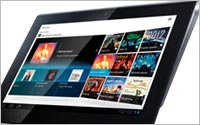Commentary
Microsoft Windows 8 OS Could Become Thorn In Google's Side
- by Laurie Sullivan , Staff Writer @lauriesullivan, January 11, 2012
 No -- search and social engines are not ready to play nice. Marketers will just have to own up to the fact that one search engine will not become
everything to everyone. Each will do what it can to improve the chance that people use their services. For now, Google holds the majority of explicit organic search and paid-search market
share, but Microsoft could continue to creep up and eventually change the dynamics with the introduction of Windows 8 and the Metro interface used in Windows Phone, and the Xbox 360
entertainment console.
No -- search and social engines are not ready to play nice. Marketers will just have to own up to the fact that one search engine will not become
everything to everyone. Each will do what it can to improve the chance that people use their services. For now, Google holds the majority of explicit organic search and paid-search market
share, but Microsoft could continue to creep up and eventually change the dynamics with the introduction of Windows 8 and the Metro interface used in Windows Phone, and the Xbox 360
entertainment console.
Today, Google commanded 65.9% of explicit (excluding contextual/instant and slide show searches) search market share in December 2011, comScore estimates. Overall, explicit search queries from engines rose 11% to 18.2 billion searches in December compared with the same month in the prior year.
Assuming that Windows 8 ships with limited or no programming bugs, because the touch interface seen in Windows Phone will have had a brief time to mature, the screen revolution coming to desktop computers could change the game for search marketing in 2012. Users will have an option to pre-program the blocks that make up the Metro interface, allowing them to directly connect with any app or social network.
The Lenovo Yoga, which transforms from a laptop to a tablet complete with touchscreen, will have this option when it ships congruent with Windows 8. Tracey Trachta, VP of consumer marketing for the computer maker, explains how users can program the tiles to log directly into their Facebook or Twitter accounts, along with other social networks.
Microsoft's operating system taps into its mobile phone user interface, making the point of integrating social into search queries -- in my opinion, a non-point. It even could distract searchers from finding valuable information. If I want to know what my friends think, I'll ask them or read what they have to say on a social network. Not in my search results.
Meanwhile, Twitter criticized Google's social search changes announced Tuesday, suggesting that it promotes and favors Google+ content in the search engine results pages (SERPs) and hinders the ability of people to locate information in Twitter messages. Twitter fired back at Google, asserting that it will make finding tweets more difficult. "Bad day for the Internet. http://bit.ly/Am5bqz Having been there, I can imagine the dissension @Google to search being warped this way," tweeted Alex Macgillivray, Twitter GC, policy and trust & safety.
Yes, Macgillivray posts a disclaimer on his Twitter profile stating that the tweeted views are his own, and not necessarily Twitter's. He also points to John Battelle's blog post, which explains how Google will fully incorporate Google+ into its search index, "as if Facebook doesn’t exist." It discusses how this doesn't actually integrate "your world," the user -- but rather the world Google wants you to see. Like the world didn't see these changes coming, with Google opting to serve up in the SERPs Google+ social results, rather than Twitter or Facebook.
Microsoft, which owns a minority stake in Facebook, worked to integrate the content into Bing search results. Twitter had an agreement with Google allowing real-time tweets to index in Google results, but the agreement slipped deadline renewals last year and the deal was not renewed.




And to think we're still only about 15 years into a 50 - 60 year internet revolution. I can't even imagine what the next decade will reveal.